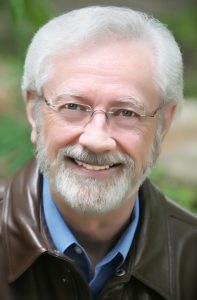This is the fourth in a series of articles on sexual diversity.
C.S. Lewis referred to his atheism prior to his conversion to Christianity as “willful blindness.” This description undoubtedly describes my state of spiritual blindness before I began seeing what I call “the light shining under the door” regarding diverse sexuality.
From a scientific perspective, I already leaned strongly to the notion that there are indeed biological factors involved in the origin of sexual orientation. But the limitations inherent in the scientific study of diverse sexuality, plus the variety of interpretations of biblical passages passed on for thousands of years through complex languages and cultures, represented a substantial challenge for me.

Dan McGee
For many years, I wrestled internally with the conflict between what I was observing in Christian pulpits, publications and especially in denominational resolutions that tried to spiritualize rejection of gays with “hate the sin but love the sinner” language. But what I was observing privately in the lives of gays, lesbians and bisexuals who were devout people of faith was a great deal of unnecessary trauma and pain. When you take mental health seriously as a “calling,” you don’t pick who will show up at your door. God continued to allow very special people to cross my office threshold, and from them I learned a great deal.
The questions that haunted me were:
- How could I go against what for centuries have been the interpretations of Scriptures regarding same-sex behavior?
- How could I come to such conclusions with conviction when those who nurtured, educated, ordained and employed me overwhelmingly oppose these convictions?
I have diligently reviewed these passages, their historical settings, the languages involved and the variety of scholarly interpretations of them. But then I considered them in a broader context, the teaching and actions of Jesus Christ. Along with the voices of ancient traditions and cultural expectations I began to hear another voice.
Why do I believe I do not have the right to ask a gay, lesbian or bisexual to change his or her sexual orientation even if it were possible? Because I am not God, and I am not privy to what goes on between an individual and the God who gave and sustains that person’s life. Because only God determines who is qualified for the kingdom of God, and I find nothing in the teachings of Jesus that requires people to make a biological or psychological change they do not have the power to make.
Jesus had a way of knowing the heart of each invitee into the kingdom, and sometimes the breadth of his invitation baffles us. But two things are clear to me in God’s “whosoever” invitation: I personally have done nothing to earn God’s invitation, and it is not my place to judge who is and who is not welcome into the family of faith.
“I personally have done nothing to earn God’s invitation, and it is not my place to judge who is and who is not welcome into the family of faith.”
Restlessness always precedes major change. I’ve learned to recognize and welcome that sense of unrest. I began recognizing the voice I was hearing as the voice of creation, the voice of love, the voice of redemption and reconciliation, affirming and confirming within me that the time to exercise the voice given me is now. The time had come for me to answer the question, “Whose voice will you listen to? Those whose support and affirmation you have so earnestly sought and received, or the voice who over a lifetime has faithfully guided you through difficult choices and turbulent waters?”
The answer is simple, but not easy.
I am a slow learner, and not a very courageous one. I always must do war with my lifelong desire for approval. But I am learning to allow that voice to give meaning to my academic, scientific and clinical exposure to human behavior.
It is unethical and immoral to receive a gift and not share it, regardless of the consequences. After considerable deliberation, conversation and prayer, I am “coming out” as a cisgender Christian sexologist who believes in the “whosoever will” of the gospel.
My Baptist education and heritage taught me the meaning of “soul competency.” Every Christian has the freedom and responsibility to interpret Scripture. My undergraduate and seminary training emphasized the importance of looking studiously at the historical context of Scripture, the languages and processes through which the Scripture miraculously survived, but, above all, to recognize the living God of the Scripture over a legalistic obsession with the written record of God’s revelation to his people.
Since the fifth century, devout Catholics have honored and practiced lectio divina, what some call “praying the Scriptures.” I believe through this process God’s Spirit who inspired the words is present to interpret and apply the words in a meaningful way to each person who consents to God’s presence.
In my spiritual journey, God admonishes me to resist my predisposition to judge those who don’t see things the way I do. My dear friend the late Gert Behanna, renowned author, speaker and recovering alcoholic, used to say that her most perplexing sin was looking down on people who look down on people. I know about this challenge also and I do not question the motives, sincerity or dedication of those who see this issue differently.
I certainly believe one’s faith in a loving God is a powerful force in changing behaviors. I no longer believe, however, that changing one’s sexuality is necessary to a devout faith in God and discipleship as taught and modeled by Jesus.
“I no longer believe, however, that changing one’s sexuality is necessary to a devout faith in God and discipleship as taught and modeled by Jesus.”
For two thousand years, Christians have been divided and institutionalized based on different interpretations of selected Bible passages. Yet we all share a common faith based on the words of Jesus found not only in the often-quoted John 3:16, but also in the verse that follows it, “God did not send his Son into the world to condemn its people. He sent him to save them.”
Whatever our perspectives on diverse human sexuality, Jesus left no doubt as to how his followers are to respond to those who are rejected, marginalized or who do not fit our own expectations. We are not called to define who is and who is not acceptable to God. We do not need to ask, “What would Jesus do?” We need only to look at what Jesus did. When we do, we will become expressions of love by accepting, appreciating and affirming all of God’s creation.
Dan McGee is an author, blogger and consultant on spiritual issues with an extensive background in psychology and ministry. He is an ordained Baptist minister with a bachelor’s degree from Baylor University, master’s degree from Southwestern Baptist Theological Seminary and Ph.D. from Texas Woman’s University. As a clinical sexologist and director of the Hardin-Simmons University Graduate Program in Family Psychology, Dan directed the Family Psychology Center and was responsible for clinical supervision of all interns in practice there and at satellite centers across West Texas. He is the author of Celebrating Sex in Your Marriage and Experiencing God’s Presence.
Related articles in this series:
When a teenager gets kicked to the curb by Christian parents


